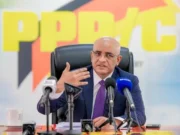The Parliamentary Opposition, the Peoples’ Progressive Party/Civic (PPP/C), has declared its intention to engage the Commissioner of Police to not arrest persons who refuse to be part of the ongoing house-to-house registration.
The party’s intention was conveyed by its leader Bharrat Jagdeo moments ago in a news conference at his Church Street, Georgetown office.
The National Registration Act – Sections 6.5, 6.6 and 6.7 – stipulates that every eligible person who refuses to make an application for registration shall be liable on summary conviction to a fine of $16,250 or imprisonment for six months.
Jagdeo, in restating his party’s position, said that the house-to-house registration — which commenced last Saturday, July 20, 2019 — is illegal since its operationalisation stemmed from an order given by the former Chairman of the Guyana Elections Commission (GECOM), Justice (Retired) James Patterson whose 2016 appointment was deemed unconstitutional by the Caribbean Court of Justice (CCJ) last month.
The opposition leader reiterated his call for Guyanese to boycott the process, noting that the police cannot charge everyone who fails to comply.
“They cannot charge 50,000 people [or] 100,000 people. We will ask the Commissioner of Police to not be part of this activity,” Jagdeo said, while claiming that his party will provide the necessary legal support to fend off any legal action that might face persons who do not comply with the registration process.
The politician further claimed that there is no functioning commission and the process is being conducted without PPP/C scrutineers.
The house-to-house registration being carried out by GECOM is now marred in controversy following the CCJ’s validation of the no-confidence motion, which has now reduced the David Granger-led regime into a “caretaker” government.
The controversy was further exacerbated after a notice signed by former Chairman Patterson was published informing the nation that the process of house-to-house will commence from July 20, 2019. The notice was placed days before the CCJ ruled that Patterson’s appointment was unconstitutional and therefore flawed.
There are factions within society who believe that the CCJ’s ruling on the appointment of Patterson has overtaken the operationalisation order. There are also some who believe that the order is unaffected by the ruling since it was gazetted when Patterson’s position was deemed as bona fide.
The coalition government, in the meanwhile, has given its support to the process, claiming that it contains the required methodological components to accurately capture electorate data for a new voters’ list following the expiration of the last one in April of this year.
President Granger is on the record claiming that the expired list cannot be reused since it is “bloated” by over 200,000. However, Chief Elections Officer (CEO) of GECOM Keith Lowenfield says that the Head of State’s claim is speculative.
The PPP/C, on the other hand, is contending that the house-to-house process will surpass the constitutional deadline imposed by Article 106 (6) and (7), which provides guidance on the way forward after a government has fallen to a no-confidence motion. Elections, it says, must be held within three months.
Earlier this week, an unsuccessful attempt was made to stop the process. Chief Justice Roxane George-Wiltshire refused to grant an application by attorney-at-law Christopher Ram, who had approached the court seeking a Conservatory Order prohibiting the election body’s registration exercise.
The argument was that the ongoing process will surpass the September 18 elections deadline. According to previous reports, the Chief Justice requested more evidence to persuade her that the exercise will go past that date.













